Related Research Articles
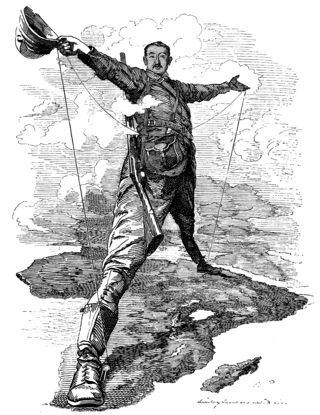
The influence and imperialism of Western Europe and associated states peaked in Asian territories from the colonial period beginning in the 16th century and substantially reducing with 20th century decolonization. It originated in the 15th-century search for trade routes to the Indian subcontinent and Southeast Asia that led directly to the Age of Discovery, and additionally the introduction of early modern warfare into what Europeans first called the East Indies and later the Far East. By the early 16th century, the Age of Sail greatly expanded Western European influence and development of the spice trade under colonialism. European-style colonial empires and imperialism operated in Asia throughout six centuries of colonialism, formally ending with the independence of the Portuguese Empire's last colony Macau in 1999. The empires introduced Western concepts of nation and the multinational state. This article attempts to outline the consequent development of the Western concept of the nation state.
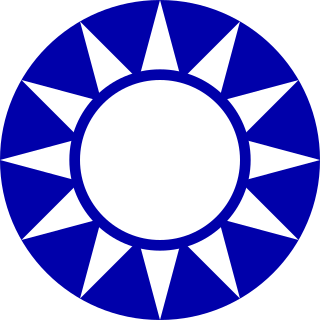
The Kuomintang (KMT), also referred to as the Guomindang (GMD), the Nationalist Party of China (NPC) or the Chinese Nationalist Party (CNP), is a major political party in the Republic of China, initially based on the Chinese mainland and then in Taiwan since 1949. The KMT is a centre-right to right-wing party and the largest in the Pan-Blue Coalition. Its primary rival is the Democratic Progressive Party (DPP) and its allies in the Pan-Green Coalition. As of 2024, the KMT is the largest single party in the Legislative Yuan. The current chairman is Eric Chu.

China has great physical diversity. The eastern plains and southern coasts of the country consist of fertile lowlands and foothills. They are the location of most of China's agricultural output and human population. The southern areas of the country consist of hilly and mountainous terrain. The west and north of the country are dominated by sunken basins, rolling plateaus, and towering massifs. It contains part of the highest tableland on earth, the Tibetan Plateau, and has much lower agricultural potential and population.
Colonization is a process of establishing control over foreign territories or peoples for the purpose of exploitation and possibly settlement, setting up coloniality and often colonies, commonly pursued and maintained by colonialism.
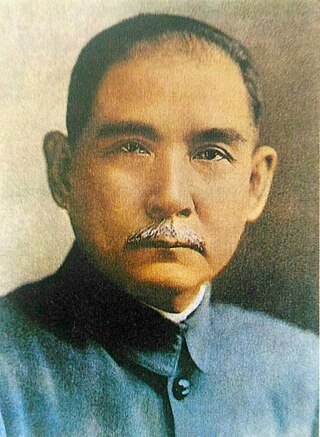
The Three Principles of the People is a political philosophy developed by Sun Yat-sen as part of a philosophy to improve China made during the Republican Era. The three principles are often translated into and summarized as nationalism, democracy, and the livelihood of the people. This philosophy has been claimed as the cornerstone of the nation's policy as carried by the Kuomintang; the principles also appear in the first line of the national anthem of the Republic of China.
Ethnic minorities in China are the non-Han population in the People's Republic of China (PRC).
Sinicization, sinofication, sinification, or sinonization is the process by which non-Chinese societies or groups are acculturated or assimilated into Chinese culture, particularly the language, societal norms, culture, and ethnic identity of the Han Chinese—the largest ethnic group of China.
Decolonization is the undoing of colonialism, the latter being the process whereby imperial nations establish and dominate foreign territories, often overseas. The meanings and applications of the term are disputed. Some scholars of decolonization focus especially on independence movements in the colonies and the collapse of global colonial empires. Other scholars extend the meaning to include economic, cultural and psychological aspects of the colonial experience.
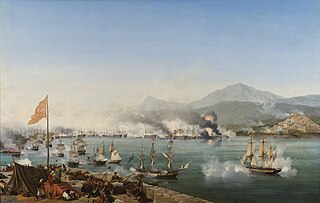
Wars of national liberation, also called wars of independence or wars of liberation, are conflicts fought by nations to gain independence. The term is used in conjunction with wars against foreign powers to establish separate sovereign states for the rebelling nationality. From a different point of view, such wars are called insurgencies or rebellions. Guerrilla warfare or asymmetric warfare is often utilized by groups labeled as national liberation movements, often with support from other states.
A multinational state or a multinational union is a sovereign entity that comprises two or more nations or states. This contrasts with a nation state, where a single nation accounts for the bulk of the population. Depending on the definition of "nation", a multinational state is usually multicultural or multilingual, and is geographically composed of more than one country, such as the countries of the United Kingdom.

The culture of Asia encompasses the collective and diverse customs and traditions of art, architecture, music, literature, lifestyle, philosophy, food, politics and religion that have been practiced and maintained by the numerous ethnic groups of the continent of Asia since prehistory. Identification of a specific culture of Asia or universal elements among the colossal diversity that has emanated from multiple cultural spheres and three of the four ancient River valley civilizations is complicated. However, the continent is commonly divided into six geographic sub-regions, that are characterized by perceivable commonalities, like culture, religion, language and relative ethnic homogeneity. These regions are Central Asia, East Asia, North Asia, South Asia, Southeast Asia and West Asia.

Chinese expansionism is an expansionism that has been identified with different phases of territorial expansion in Chinese history.

The Asian Relations Conference was an international conference that took place in New Delhi from 23 March to 2 April, 1947. Organized by the Indian Council of World Affairs (ICWA), the Conference was hosted by Jawaharlal Nehru, then the Vice-President of the interim Viceroy's Executive Council, and presided by Sarojini Naidu. Its goal was to promote cultural, intellectual and social exchange between Asian countries.
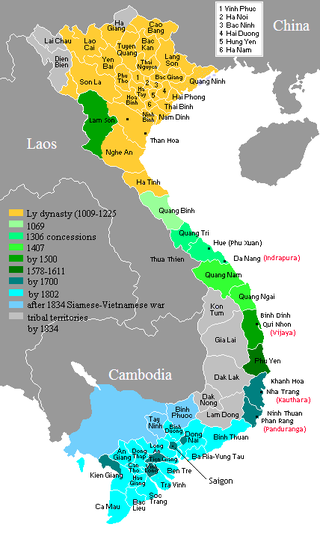
Nam tiến is a historiographical concept that describes the historic southward expansion of the territory of Vietnamese dynasties' dominions of Đại Việt from the 11th to the 19th centuries. The concept of Nam tiến has differing interpretations, with some equating it to Viet colonialism of the south and to a series of wars and conflicts between several Vietnamese kingdoms and Champa Kingdoms, which resulted in the annexation and Vietnamization of the former Cham states as well as indigenous territories.

Settler colonialism occurs when colonizers invade and occupy territory to permanently replace the existing society with the society of the colonizers.

Anti-imperialism in political science and international relations is opposition to imperialism or neocolonialism. Anti-imperialist sentiment typically manifests as a political principle in independence struggles against intervention or influence from a global superpower, as well as in opposition to colonial rule. Anti-imperialism can also arise from a specific economic theory, such as in the Leninist interpretation of imperialism, which is derived from Lenin's 1917 work Imperialism, the Highest Stage of Capitalism. People who categorize themselves as anti-imperialists often state that they are opposed to colonialism, colonial empires, hegemony, imperialism and the territorial expansion of a country beyond its established borders.
The United Front for the Liberation of Oppressed Races waged a nearly three decade long insurgency against the governments of North and South Vietnam, and later the unified Socialist Republic of Vietnam. The FULRO insurgents represented the interests of indigenous Muslim and Hindu Cham, Montagnards, and Buddhist Khmer Krom against the ethnic Kinh Vietnamese. They were supported and equipped by China and Cambodia according to those countries' interests in the Indochina Wars.

Vietnamese nationalism is a form of nationalism that asserts the Vietnamese people as a separate independent nation. It encompasses a broad range of ideas and sentiments harbored by the Vietnamese people in regards with national identity.
Han chauvinism is a political ideology that speaks out for the ethnic Han Chinese people and its uniqueness throughout human history. Han chauvinists believe that the current influence from the West has downgraded the development of China's own cultural customs, and in response, it has become instrumental in leading the increasingly traditionalist movement, which was launched in 2001. Participants come together both online and in person in cities across China to revitalize their vision of the authentic “Great Han” and corresponding “real China” through traditional ethnic dress and Confucian ritual.

The connection between colonialism and genocide has been explored in academic research. According to historian Patrick Wolfe, "[t]he question of genocide is never far from discussions of settler colonialism." Historians have commented that although colonialism does not necessarily directly involve genocide, research suggests that the two share a connection.
References
- 1 2 3 4 5 6 Howe (2002).
- ↑ Pinderhughes (2011).
- ↑ Howe (2002), p. 18.
- 1 2 Howe (2002), p. 19.
- ↑ Peckham (2004).
- 1 2 Howe (2002), p. 20.
- ↑ Shahrani (2002), p. 717.
- ↑ Mukhopadhyay (2014), p. ?.
- ↑ Verdery, Katherine (1979). Internal Colonialism in Austria-Hungary in Internal Colonialism in Comparative Perspective. Vol. 2. Inist-CNRS. pp. 378–399. Retrieved 24 April 2024.
- ↑ Epp Annus (2012) "The Problem of Soviet Colonialism in the Baltics," Journal of Baltic Studies, 43:1, 38.
- ↑ Epp Annus (2012) "The Problem of Soviet Colonialism in the Baltics," Journal of Baltic Studies, 43:1, pp.36-37
- ↑ Epp Annus (2012) "The Problem of Soviet Colonialism in the Baltics," Journal of Baltic Studies, 43:1, pp.38.
- ↑ "No love lost for Tagalog". Manila Standard .[ permanent dead link ]
- ↑ Martinez (2004), p. 447.
- ↑ "Apon Ti Exilo: The illogic and illiteracy of this de la Salle professor of Filipino".
- ↑ Werning, Rainer (2009). "Southern Philippines: Bitter Legacies of a Long-Lasting War". In Graf, Arndt; Kreuzer, Peter; Werning, Rainer (eds.). Conflict in Moro Land: Prospects for Peace?. Universiti Sains Malaysia. pp. 6–8.
- ↑ Rodell, Paul A. (2005). "The Philippines and the Challenges of International Terrorism". In Smith, Paul J. (ed.). Terrorism and Violence in Southeast Asia: Transnational Challenges to States and Regional Stability. M. E. Sharpe. pp. 125–127.
- ↑ Muslim, Macapado A. (1994). The Moro Armed Struggle in the Philippines: The Nonviolent Autonomy Alternative. Office of the President and College of Public Affairs, Mindanao State University. pp. 91–93.
- ↑ Wurfel, David (1988). Kahin, George McT. (ed.). Filipino Politics: Development and Decay. Cornell University Press. p. 31.
- ↑ Rüland, Jürgen (2006). "Ethnic Conflict, Separatism and Terrorism". In Hoadley, Stephen; Rüland, Jürgen (eds.). Asian Security Reassessed. Institute of Southeast Asian Studies. p. 233.
- ↑ McKenna, Thomas M. (1988). Muslim Rulers and Rebels: Everyday Politics and Armed Separatism in the Southern Philippines. University of California Press. p. 137.
- ↑ Hechter (1975).
- ↑ Brown (1994), pp. 158–205.
- ↑ Üngör, Ugur Ümit (2012-03-01). The Making of Modern Turkey: Nation and State in Eastern Anatolia, 1913-1950. OUP Oxford. p. 175. ISBN 978-0-19-164076-6.
- ↑ Üngör, Ugur Ümit (2012-03-01), p.135
- ↑ Üngör, Ugur Ümit (2012-03-01). p.161
- ↑ Dreyer, June Teufel; van Walt van Praag, Michael C. (1988). "The Status of Tibet: History, Rights, and Prospects in International Law". Pacific Affairs. 61 (2): 340. doi:10.2307/2759325. ISSN 0030-851X. JSTOR 2759325.
- ↑ "Trần Lâm – Kiêu dân công giáo thời Ngô Đình Diệm : talawas blog" . Retrieved 2021-12-19.
- ↑ "sừ liệu quốc nội và nền sử học dân tộc chủ nghĩa Việt (phần 2)". Tạp chí Da Màu - Văn chương không biên giới. 2010-10-19. Retrieved 2021-12-19.
- ↑ Bảnh, Nguyễn Văn (2018-04-19). "Thảm trạng của Nam Kỳ - Bắc Kỳ ban phát". Người Nam Kỳ. Retrieved 2021-12-19.[ permanent dead link ]
- ↑ Tom, Fawthrop (2019-11-26). "Did Vietnam Just Doom the Mekong?". The Diplomat.
- ↑ An example of this proverb's use can be found the following quote from David C. Martínez:
[W]e've left sacred and untouched, spotless and unsullied, the same centralist authority where near-absolute political power continues to reside: Imperial Manila. My father spoke the truth when he used to lament in Cebuano, "Wa y dahong mahulog sa atong nasud nga di mananghid sa Malacañang" (Not a leaf can fall in our country without Malacañang's permission) [14]
- ↑ For instance, in Filipino ng mga Filipino, Almario called for the ousting of troublemaking politicians in the province of Cebu.